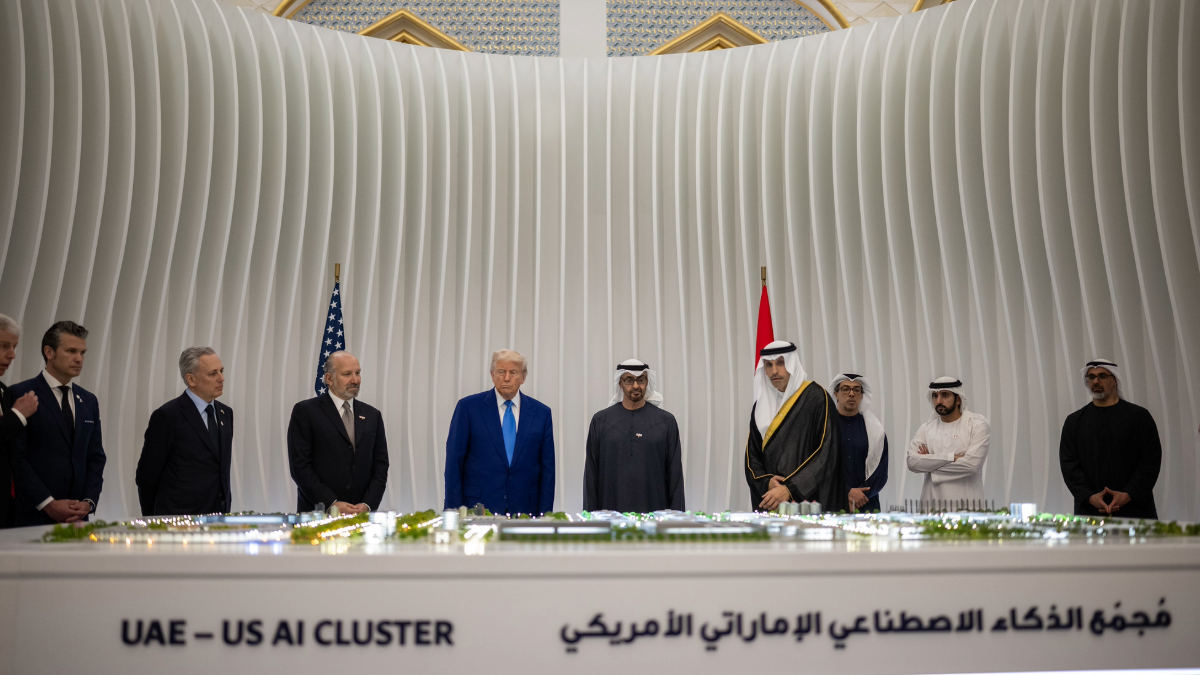How the UAE Is Betting Big on AI to Expand Its Global Influence
Alainna Liloia / Aug 20, 2025
President Donald Trump participates in a tour at Qasr Al Watan in Abu Dhabi, United Arab Emirates, Thursday, May 15, 2025. (Official White House Photo by Daniel Torok)
As the US and China compete for AI dominance, the UAE is leveraging its investments in AI technologies to make itself indispensable – and untouchable – to both allies and adversaries.
Across the Gulf, countries are prioritizing AI development to boost their economies and to position themselves favorably relative to the United States, China, and other global powers. The UAE and Saudi Arabia are leading the charge, investing in data centers and partnering with tech giants like OpenAI, Microsoft, Google, and Amazon Web Services.
Presenting itself as a leading voice in artificial intelligence globally, the UAE is using AI as a means to amass soft power and bolster the country’s brand as a modern state at the forefront of technological innovation. Emirati leaders view AI technologies as a new resource to develop and deploy, ensuring that their offerings are irresistible to global partners.
Data centers and diplomacy
The building of data centers in-country is a central pillar of the UAE’s strategy to position itself as an AI hub and emerging superpower. Abu Dhabi and the US announced a multimillion-dollar deal in May to build an AI campus that will become the largest AI infrastructure outside of the United States.
The massive data center cluster will eventually have a capacity of 5 gigawatts (GW). It will contain Stargate UAE, a 1GW cluster to be funded and built by the state-backed Emirati tech firm G42 through a partnership with OpenAI. Other Western tech firms included in the venture are Oracle, NVIDIA, Cisco, and SoftBank. The deal also includes ChatGPT Plus subscriptions for the UAE’s entire population, a perk no other country has yet.
An obvious reason for the UAE’s focus on AI is its potential for boosting economic development. AI presents lucrative opportunities at a time when nations across the Gulf are aiming to diversify their economies, which are heavily dependent on revenue from fossil fuels. Yet, the country’s AI agenda is far more than a monetary investment.
Forming partnerships with global powers and tech companies increases the UAE’s soft power and diplomatic influence. By providing the land, funding, and infrastructure tech giants need to build highly desired data centers, the UAE plays a valuable role in fulfilling the priorities of the US government around AI. The Stargate deal also included a promise that the UAE will match its investments in the data center project with investments in the US's AI infrastructure, including OpenAI.
The UAE is integrating itself into the US AI landscape in other ways as well. The Mohamed bin Zayed University of Artificial Intelligence (MBZUAI) launched an AI-focused research lab in Silicon Valley in May, along with an AI world model and agent, and two Large Language Models (LLMs) developed by the lab’s researchers.
Meanwhile, Emirati leaders are also investing in AI initiatives at home, particularly through the Technology Innovation Institute (TII), funded by the Abu Dhabi government. TII offers advanced AI software in the form of Falcon AI for free, setting itself apart from Western corporations that charge for their advanced software.
The company also released Falcon Arabic, an AI chatbot that it touts as the top-performing Arabic AI model in the region. The development of an Arabic AI model is a potentially lucrative move at a time when companies throughout the Middle East are adopting AI.
By offering its own software and providing it for free, TII is strategically positioning itself as an alternative to Western AI companies, increasing the potential for companies and governments to partner directly with the UAE for AI development and implementation.
AI investments and soft power
The more enmeshed the UAE becomes in the global AI apparatus, the more difficult or undesirable it becomes for allies to question or control the country politically. If the UAE makes itself indispensable to the AI ambitions of other nations, this can lead to less willingness among government leaders to enact political pressure or leverage diplomatic relationships to rein in actions they would otherwise.
This may be cause for concern among the human rights community, particularly considering the UAE’s harsh repression of free speech and resistance and its current involvement in Sudan's civil war by supplying weapons to the RSF (Rapid Support Forces).
While international governance around AI is still developing, it is worth considering whether or not the UAE’s use of AI will comply with human rights principles and existing frameworks like the intergovernmental AI principles developed by the Organization for Economic Co-operation and Development (OECD).
Moreover, the Emirati government’s track record of using technology to surveil and enact authoritarian control over its own citizens raises questions about how trustworthy a partner the UAE is in developing sensitive technologies. The government recently announced that it is using AI technologies to “fight crime” in the digital sphere and has long deployed technology to target those who speak out against its policies.
Yet, the US has already shown leniency in data-sharing with the UAE, making a preliminary deal in May that would have allowed the UAE to import millions of NVIDIA artificial intelligence chips. The deal is reportedly on hold now due to concerns of China accessing the chips, but it is a prime example of how the boundaries of trust can shift when economic and political priorities are on the line.
For the US, partnering with the UAE is viewed as an effective or even necessary means to achieve its strategic ambitions around AI. The choices the US makes around AI partnerships are particularly significant considering the issues that already exist around how US tech companies are using consumer data and AI’s potential to exacerbate data privacy issues.
The alliance between the US, the UAE, and tech giants like OpenAI raises questions about how much power each government and corporation holds, and what they will do – or not do – with their collective power. These questions are all the more relevant in the wake of Trump’s AI action plan, released in July, which calls for deregulatory measures around AI that will place more unchecked power in the hands of tech companies.
As emerging technologies continue to evolve rapidly, the UAE’s investment in AI is a strong bid for soft power. If Emirati leaders succeed in transforming the nation into an AI superpower, the power and resources they control could offer significant leverage – much like the influence once held through oil, the world’s most coveted resource.
Authors
